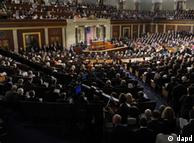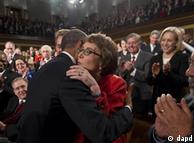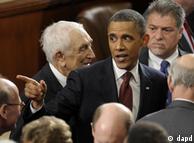UNITED STATES | 25.01.2012
State of the Union marks Obama's coming out as a liberal
Ever since he catapulted himself from obscurity into the national and international spotlight with his speech at the Democratic convention in 2004, the rhetorical bar has been high for Barack Obama.
His perception as a great orator and writer was only compounded by his highly praised autobiography and by his political treatise "The Audacity of Hope." Both won Grammy Awards as Best Spoken Word Albums. The latter also inspired the New York Times to single Obama out as "that rare politician who can actually write - and write movingly and genuinely about himself."
Judged against that standard, President Obama's Speech of the Union might be labeled a letdown. But is it fair - to use a leitmotif of his speech - to compare a State of the Union speech in a divisive election year to the rhetoric before Obama took office?
Probably not and when judged purely on its merits and within the genre of State of the Union addresses, his speech did what it was supposed to do.
Partisan divide
"I would regard it as one of his better and more forceful speeches but not his most memorable speech," says Claus Hofhansel, a professor of political science at Rhode Island College in Providence, Rhode Island.
"Eloquence is in the eye of the partisan," noted Elvin Lim, an associate professor of government at Wesleyan University in Middletown, Connecticut, meaning that Democrats will like the speech, Republicans won't.
Obama's address included boilerplate appeals to bipartisanship and unity among Americans. Another classical rhetorical element of American speech-making, the jeremiad, was also served via sentences like these: "We can do this. I know we can, because we've done it before."
 Barack Obama delivererd his speech before a Congress in election mode"But underneath the references to American rather than Democratic or Republican values were quite forceful criticisms of Republican obstructionism in Congress and repeated jabs at Republicans," explains Hofhansel.
Barack Obama delivererd his speech before a Congress in election mode"But underneath the references to American rather than Democratic or Republican values were quite forceful criticisms of Republican obstructionism in Congress and repeated jabs at Republicans," explains Hofhansel.
Lim agrees: "If there was one constant in his speech, it was his setting of a contest between him and a do-nothing Congress - which surely will be less popular in the months ahead than whoever he takes on as the Republican candidate."
Obama on the offensive
With a Republican Party that has been steadily veering further to the right, a trend that has only been exacerbated by the primary race, Obama strongly defended his record and laid out his reelection platform.
"The state of our Union is getting stronger," said Obama, arguing that more than three million jobs were created in the past 22 months and that US manufacturers have created new jobs for the first time since 1990.
The president didn't simply make the case for his campaign platform consisting of the triad of fairness, shared responsibility and shared sacrifice, but also used the bully pulpit to go on the offensive.
"Obama took on the banks' 'deficit of trust,' and BP, while delivering the red-meat about comprehensive immigration reform and setting the standard that anyone who makes more than a million a year should not pay less than 30 percent of that income in tax," says Lim. "What mattered was not what Congress delivered, but that he 'would fight obstruction with action.'"
For Barack Obama who has been harshly criticized for his centrist approach repeatedly from the progressive wing of his party, this speech can be considered as a sort of a coming out as a real liberal in the American sense of the word.
"Though there were the predictable overtures for post-partisanship, this was a more unapologetically liberal president than we have seen since he was inaugurated," argues Lim.
Honorable mention for Germany
With the domestic agenda dominating the political debate, foreign policy played only a minor role in the speech. No big surprises there. For instance, Obama reiterated that vis-à-vis Iran all options remain on the table.
Most other international references were related to economic issues with Germany and Siemens receiving honorable mention by being named several times during the address. "This clearly showed respect for Germany as an economic 'competitor,'" says Hofhansel.
 The speech was meant to unite Democrats around the presidentBut with the Republican primaries about to really heat up ahead of the Florida contest will the speech and its themes have any lasting impact? Probably not, argue the experts. "All State of the Union speeches I have watched include lists of specific policy proposals, executive actions taken etc. Most people, including me, quickly forget them," notes Hofhansel.
The speech was meant to unite Democrats around the presidentBut with the Republican primaries about to really heat up ahead of the Florida contest will the speech and its themes have any lasting impact? Probably not, argue the experts. "All State of the Union speeches I have watched include lists of specific policy proposals, executive actions taken etc. Most people, including me, quickly forget them," notes Hofhansel.
But that might not necessarily be a problem as the goal of the address was not to produce memorable one liners, but to rally Obama's Democratic base and Democratic-leaning moderates. And with his coming out as a liberal in time for campaign season he might just have achieved that.
Author: Michael Knigge
Editor: Rob Mudge
Editor: Rob Mudge

Comments